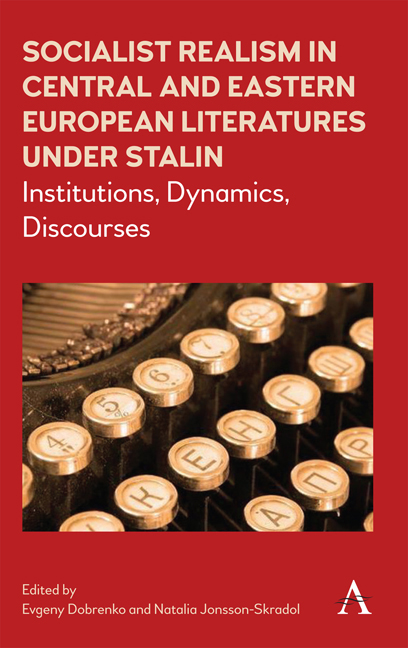 Socialist Realism in Central and Eastern European Literatures under Stalin
Socialist Realism in Central and Eastern European Literatures under Stalin Book contents
- Frontmatter
- Contents
- Acknowledgements
- Introduction
- Part 1 Institutions
- Part 2 Dynamics
- Part 3 Discourses
- 15 Introducing Socialist Realism in Hungary, 1945– 51: How Politics Made Aesthetics
- 16 When Writers Turn against Themselves: The Soviet Model and the Bulgarian Experience, 1946–56
- 17 Big Brother's Gravity: East European Literature in the Mirror of Soviet ‘Thick Journals’ in the Late 1940s
- 18 The Coming One: Prolegomena to the Positive Hero of Czech Socialist Realism as a Transforming and Transformed Subject
- 19 Will Freedom Sing as Beautifully as Captives Sang about It? Reshaping the Croatian Canon, 1945–55
- 20 The Salon in the Camp: Friendship Societies and the Literary Public Sphere in the SBZ and Early GDR
- Conclusion
- List of Contributors
- Index
16 - When Writers Turn against Themselves: The Soviet Model and the Bulgarian Experience, 1946–56
from Part 3 - Discourses
Published online by Cambridge University Press: 10 May 2018
- Frontmatter
- Contents
- Acknowledgements
- Introduction
- Part 1 Institutions
- Part 2 Dynamics
- Part 3 Discourses
- 15 Introducing Socialist Realism in Hungary, 1945– 51: How Politics Made Aesthetics
- 16 When Writers Turn against Themselves: The Soviet Model and the Bulgarian Experience, 1946–56
- 17 Big Brother's Gravity: East European Literature in the Mirror of Soviet ‘Thick Journals’ in the Late 1940s
- 18 The Coming One: Prolegomena to the Positive Hero of Czech Socialist Realism as a Transforming and Transformed Subject
- 19 Will Freedom Sing as Beautifully as Captives Sang about It? Reshaping the Croatian Canon, 1945–55
- 20 The Salon in the Camp: Friendship Societies and the Literary Public Sphere in the SBZ and Early GDR
- Conclusion
- List of Contributors
- Index
Summary
As in most other socialist countries, in Bulgaria the introduction of the socialist regime was accompanied by an imperative to engage in active criticism and, more importantly, self- criticism, often regardless of one's professional affiliations, status and true political sympathies. The campaign for criticism and self- criticism, initiated almost immediately after the coup d’état in September 1944, continued until the 1960s, with varying degrees of intensity. At first it was ‘alien elements’ who were required to make public self- critical statements – people who had either actively opposed the Bulgarian Communist Party or else refused to cooperate with it. A few years later – between 1947 and 1948 – the demands to engage in rituals of public repentance were directed at those who may have been sympathetic to the Fatherland Front, but whose behaviour had made them suspicious in the eyes of the new power. From 1949 onwards, being prepared to criticize others and – more importantly – oneself became a social norm. This chapter focuses on one group whose members, possibly more than any other sector of the population, became both victims and agents of the campaign: writers. As will become clear, the campaign in the writers’ community, while characteristic of the spirit of the age, did indeed have its own distinctive features.
The Beginning
The first wave of terror in Bulgaria, the ‘antifascist purge’, occurred between 1944 and 1945, but it did not involve demands for specific individuals to engage in rituals of (self-) criticism. Usually, those whose presence in the public sphere was considered undesirable were simply made to vanish. However, relatively early on the writers’ community became the scene of the first staged confessions of guilt, accusation and self- accusation. In his speech at the Congress of the Union of Bulgarian Writers (UBW) on 10 December 1944, philosopher and leading political functionary Todor Pavlov insisted that ‘a purge is a necessity […] essential to raise this organization to its feet. It [i.e., the purge] needs to be strict, honest, motivated, objective, but also merciless. More than anything else, it needs to be political’. So it was to be; the board of governors of the union agreed.
- Type
- Chapter
- Information
- Socialist Realism in Central and Eastern European Literatures under StalinInstitutions, Dynamics, Discourses, pp. 261 - 280Publisher: Anthem PressPrint publication year: 2018


